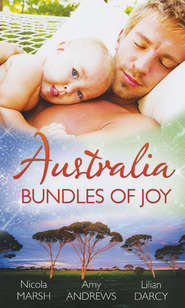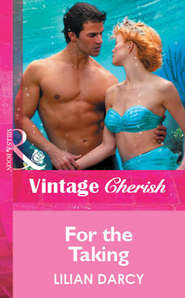По всем вопросам обращайтесь на: info@litportal.ru
(©) 2003-2025.
✖
The Children's Doctor and the Single Mum
Автор
Год написания книги
2018
Настройки чтения
Размер шрифта
Высота строк
Поля
The rest of the unit was humming along in its usual way, the bulky pieces of medical equipment with their lines and screens and alarms dwarfing the tiny babies over whom they kept guard. There were softening touches, though. A bright toy nestled in a humidicrib or a picture taped to the transparent sides. Cards and balloons. A wall of photos of their ‘graduates’—smiling toddlers who couldn’t possibly have ever been so small.
‘How was the pregnancy, Mrs Thornton?’
The mother nodded, understanding the intention behind the question. She was an intelligent woman. ‘It was trouble-free.’ She was standing, too, and rubbed her lower stomach as she spoke. She still seemed fairly sore and stiff after a powerful labour that had been abruptly ended by the emergency Caesar. ‘We were in Japan for the first half of it, though, if that makes any difference.’
‘Wow, Japan. That must have been interesting!’ Tammy said sincerely. She’d been as far as New Zealand, on her honeymoon ten years ago, but that was about it. ‘And not easy, with five kids.’
‘It’s a fascinating country. There was a lot to love, and a lot to adjust to, especially with the kids, as you say.’
‘What were you doing there?’
‘Alan—my husband—had a sabbatical. Someone organised a terrific house for us, out in the countryside. He commuted into the city. When we discovered I was pregnant again, we found a doctor who spoke English, but I found him difficult to understand. And I don’t think he understood me much either.’
‘Was the prenatal care similar to what we have here?’
‘Mostly. As I said, it was an easy pregnancy. I only saw the doctor three times, I think, for routine checks, then we came back here when I was at about five months. I did have an ultrasound there.’
‘At eighteen weeks, like we do here?’
‘Yes, just under.’ Mrs Thornton frowned. ‘Actually, I guess it was more like fifteen weeks, if Dr Lutze was right that Cameron was at thirty-four weeks when he was born, not thirty-six weeks, like we thought. I should change his nappy,’ she added.
She looked tired and uncomfortable, and Tammy found herself offering to do the change, even though she usually breathed a sigh of relief whenever a parent’s help lightened the workload.
‘Thanks,’ Mrs Thornton said. She sat down, and confessed, ‘I skipped the postnatal exercise class this morning. I’m slack!’
‘You know all too well what’s waiting for you at home.’ Tammy grinned. ‘I have five kids myself.’ She was working as she spoke, deftly untaping the sides of the nappy, gently lifting the little legs and bottom.
‘Then you understand!’ Mrs Thornton said with feeling.
The nappy felt very light. You became pretty skilled at estimating urinary output by the weight in your hand. Dry, versus slightly wet, versus nicely soaked. This one felt dry.
‘When did you last change him?’ she asked his mother.
‘Oh, it would be a couple of hours ago. What’s the time now?’
‘Almost seven-thirty.’
‘That late! In that case, it’s about four hours since I changed him.’
‘Was he very wet then?’
‘The nurse weighed the nappy. Just a few mils, she said. I think she wrote it down.’ She didn’t ask if the low output could be a problem, but Tammy could see she’d gone on the alert.
‘Let’s get you into a new one, little man,’ she murmured to the baby, wondering if this could be the source of Mrs Thornton’s nebulous worry. He shouldn’t be dehydrated. There was no obvious distension in his lower abdomen. And newborns often didn’t pee very much at first.
Still… She took his temperature, although he wasn’t due for it, and found that it had gone up a few points—38.1 degrees Celsius. He was officially febrile now, and fever in a premmie newborn wasn’t something you ignored.
She found Dr Burchell at the far end of the unit, studying the notes of a baby girl with a serious heart defect, and told him, ‘I’m not sure if this earns me that coffee you mentioned…’
‘Good coffee, right? Freshly brewed, in a china cup.’
‘That’s the one… Could there be a kidney problem? He doesn’t seem to be putting out much urine.’
‘Newborns don’t.’ Dr Burchell’s mind was clearly still on the heart baby, whose blood gases were getting worse.
The tiny girl needed surgery, Tammy knew, but she really wasn’t strong enough. They’d wanted to get her weight up higher, but it was going in the opposite direction, and her little body was exhausting itself getting that tiny, damaged heart to work.
‘He’s five days old,’ Tammy persisted, even though she understood Dr Burchell’s tight face and the frustrated way he paged through the notes and looked at the heart baby. He wanted to focus on the more serious case. ‘He’s started feeding. And his temp’s over 38.’
OK, she had his attention now. Hopefully he wouldn’t ask how much over 38 degrees. His grey eyes—a deep, liquid grey—fixed themselves on her cap, narrowing with something that was probably annoyance, and she wondered if bits of her hair were making an unauthorised escape bid. They often did.
‘You’re thinking there’s a partial blockage, and he’s having urinary reflux?’ he asked. Grey eyes, but possibly with some chips of green in a different light, Tammy mentally revised.
‘Giving him an infection, yes, that’s what I’m wondering.’
He was already looking back down at the heart baby. ‘Look, we’ll do an ultrasound. Rule it out.’
Rule it out.
His faith in her diagnostic skills clearly wasn’t high. It didn’t look as if she was getting that coffee any time soon.
‘Thanks, um, Tammy,’ he added.
‘No worries,’ she told him cheerfully, and went back to her charges, prepared to think no more about it.
Eleanor had returned from her break and was gently urging Mrs Thornton to have a relaxing shower. Little Cameron’s next nappy would probably weigh twice as much as a dry one, and Tammy would feel like an idiot for her rash diagnosis.
Yeah, that would be good.
She had a nagging suspicion that the kilos on her butt, the zeros in her bank account and the five kids at home might not be quite enough to keep her safe from a man like Laird Burchell. Tall, broad-shouldered, lovely neck, not a hint of a receding hairline, intelligent and caring and capable…and then there were those deep, perceptive eyes.
He was—if you had time to take notice of such things—gorgeous. If he decided she was an idiot, therefore, so much the better.
CHAPTER THREE
THE sprawling acreage of the Yarra Valley Garden and Landscape Centre on a Sunday morning was one of Tammy’s favourite places when she’d really, seriously, drastically run out of ideas and energy at home, didn’t want to spend much money, and when the playground down the road had earned a moaning chorus of, ‘But we’ve been there three times this week.’
Mum was taking a break today, leaving her little flat behind Tammy’s house temporarily empty. She deserved it about five times over, and had gone to Tammy’s brother’s place in Healesville for a barbecue lunch and a peaceful afternoon. His two boys were quiet lads in their late teens, and his wife—Tammy’s sister-in-law Jeannette—was a terrific person and spoiled Mum rotten. She would return refreshed, and probably bearing leftovers.
The kids had a good time at the garden centre, and Tammy was able to get some time alone, even though it was only in her thoughts. But when you’d spent over an hour letting the kids chase around the big glazed pots and orchard trees and ornamental fountains, or playing name-that-flower games, or swinging your four-year-old triplets on the swings in the designated kids’ area, you really owed it to the garden centre management to buy a plant.
Tammy always found it a terrible hardship to have to buy a plant.
In a more perfect world—a world where counting every penny occupied a much smaller portion of her time—she would have bought at least twelve.
That kaffir lime tree, for example. Or a pair of those cyclamens in bright lipstick colours. Some drought-tolerant grevilleas or bottlebrush. A lemon-scented eucalyptus. Oh, and herbs. She loved herbs.
She decided on a little punnet of lemon thyme, and accepted that five ice creams on sticks would have to be added to the bill. The spring sunshine had grown quite hot, and the kids were getting hungry and thirsty. The ice creams would reward them for good behaviour, and tide them over until she could get them home and make some lunch.











